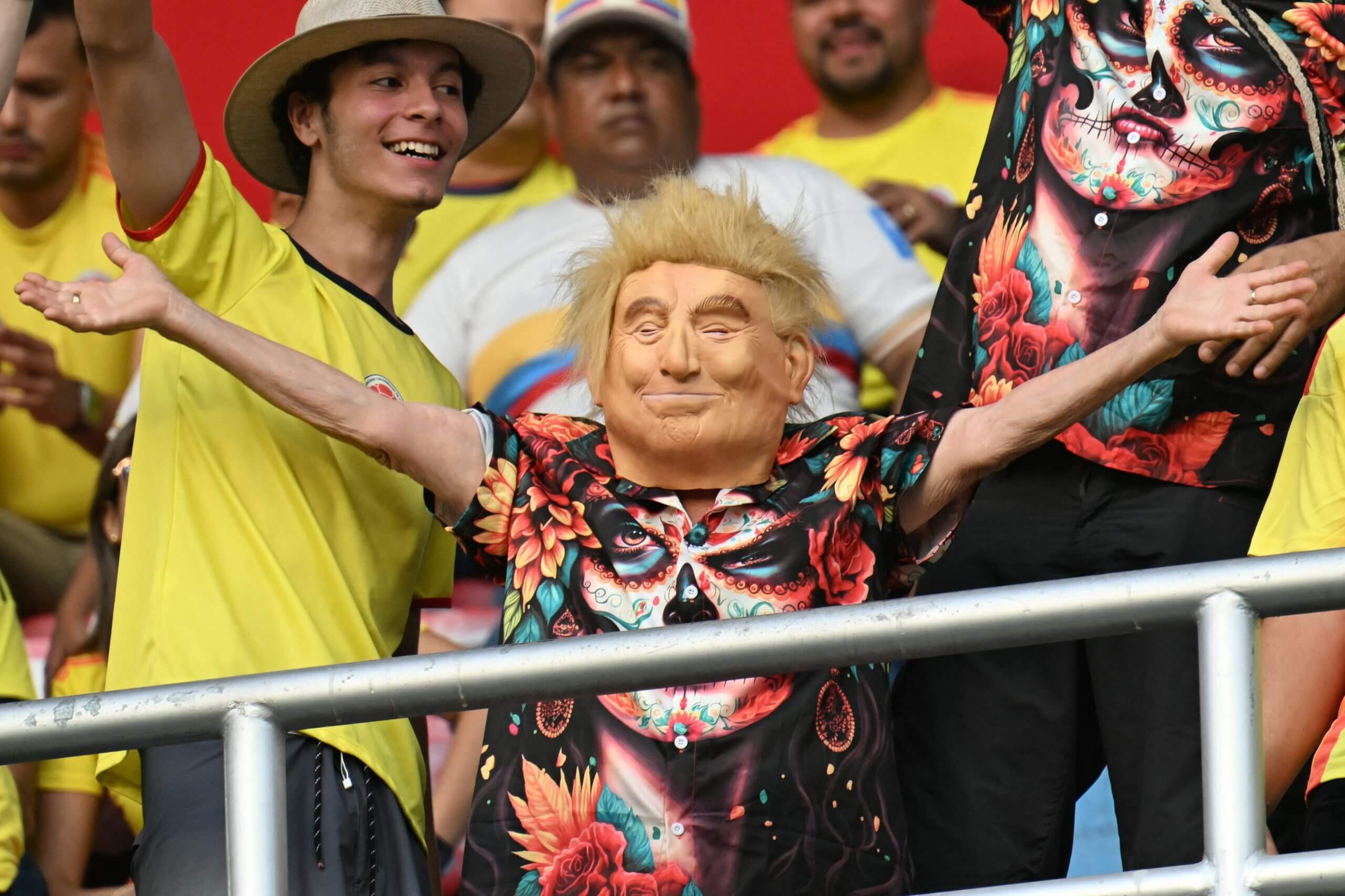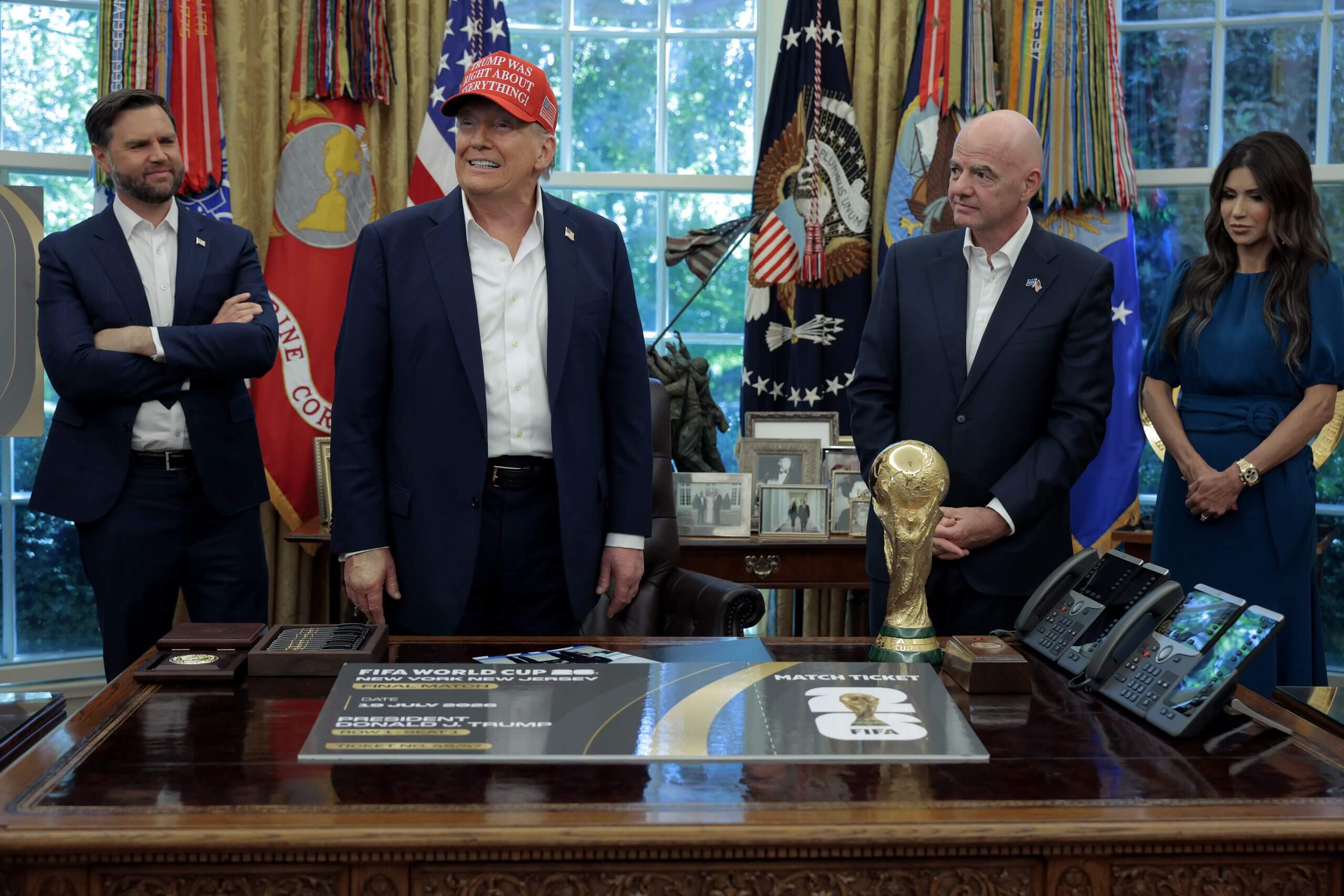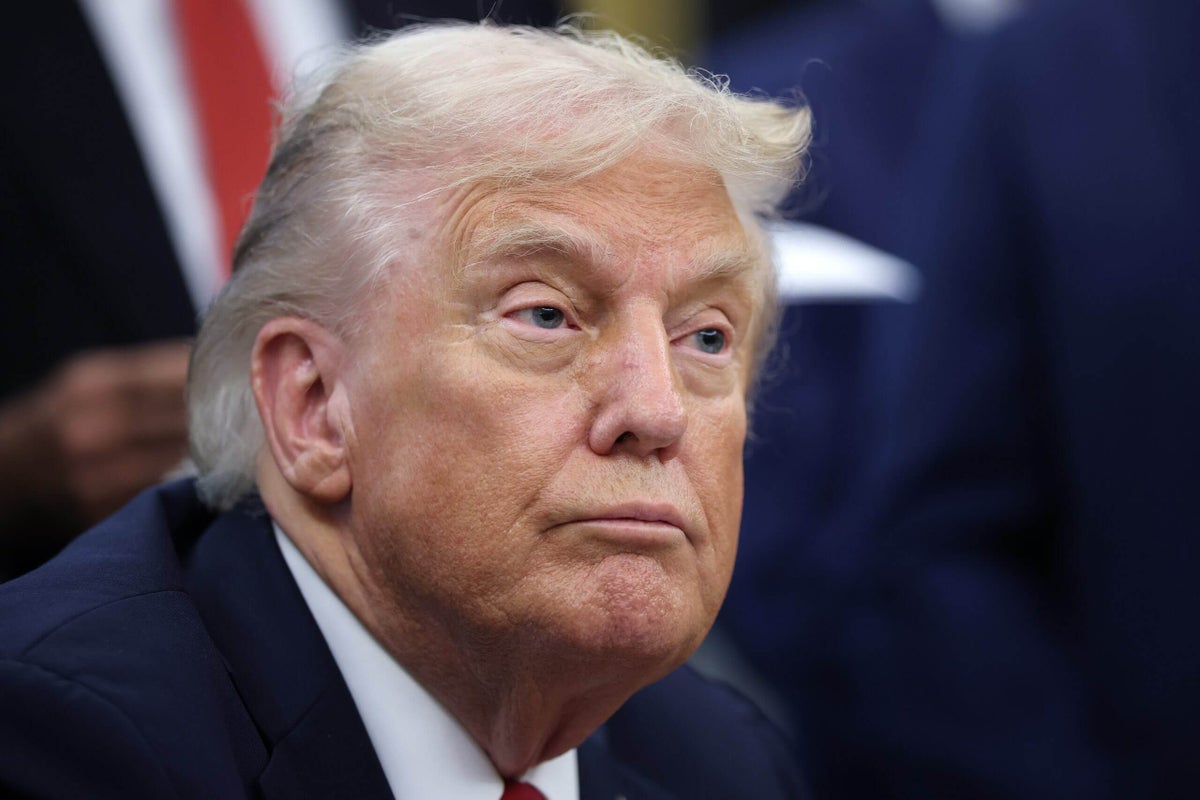In the run-up to the men’s World Cup in the summer of 2026, which will be co-hosted by the United States, Canada and Mexico, one of the key challenges for FIFA is ensuring access for the millions of soccer fans who wish to attend the tournament.
This is a particular challenge in the U.S., where lengthy visa wait times, plus President Donald Trump’s harder line on immigration, have raised concerns as to whether supporters will be able to watch their teams in action.
Now, there has been an unexpected intervention from Paraguayan model Guadalupe Gonzalez, a former Miss Universe representative for her country, who last month went on Instagram to say she met President Trump at that beauty pageant, and appealed directly to him to facilitate easier access for soccer fans from her South American homeland eager to come to the World Cup. She claimed it is “very difficult” for Paraguayans to get a U.S. visa currently.
Paraguay has qualified for the World Cup for the first time since the 2010 event in South Africa, when it reached the quarterfinals before losing to eventual champion Spain.
The Athletic explains what Gonzalez said, whether the data backs up her claims, how the U.S. State Department responded and what steps are being taken nine months out from the World Cup.
Who is Guadalupe Gonzalez and what has she said?
Gonzalez won Miss Universe Paraguay in 2013 and is the ex-wife of Paraguayan international soccer player Juan Iturbe, who represented his country 12 times between 2009 and 2019. She competed in the 2013 global Miss Universe competition in Moscow, Russia. The Miss Universe Organization was then owned by Donald Trump and he attended that event. He even announced on Twitter that Moscow would be the destination.
In a video post on Instagram, Gonzalez wore the Paraguayan national team jersey and said: “Dear Mr President Donald Trump, I had the privilege of meeting you at the Miss Universe 2013 pageant in Moscow, Russia. I’m respectfully addressing you today because I’d like to ask you something for my country.
“After 16 years, Paraguay has qualified for the World Cup, which is a huge dream that we all share. Here in Latin America, soccer is more than just a sport, it means everything to us, it is a feeling. It is very difficult to get a visa for the United States. We would be so happy if you could help us by making the visa process easier for the World Cup so that thousands of Paraguayans can fulfil their dream of attending. I know that nothing in life is impossible, everything is possible. You would make us so happy if you could help us live a little bit of the American dream. Thank you very much in advance.”
She tagged the White House, President Trump and First Lady Melania Trump in her post.
In a written message accompanying the video, she said: “Help me get there @realdonaldtrump. There are many people who were denied visas and it would be amazing that at least for the World Cup they can have easier access.”
“We won’t be angry if they give us a free pass also!”, she joked, following up with emojis of a love heart and a pleading face.
What does the data say about Paraguayan tourist visas into the United States?
The most recent data available from the U.S. government shows the adjusted refusal rate for Paraguayans applying for a ‘B’ visa (for visiting tourists) was 18.90 percent in fiscal year 2024, meaning the period between Oct. 1, 2023 and Sept. 30, 2024. Among South American countries to have already qualified for next year’s World Cup, this denial rate is higher than Argentina (8.90 percent), Brazil (15.48 percent) and Uruguay (2.63 percent) but less than Ecuador (36.99 percent) and Colombia (24.70 percent).
This period pre-dates Trump’s return to office, meaning we are yet to see the clear impact of more stringent approaches to immigration reflected in year-end data. In previous years, denial rates for Paraguayans were consistent, at 17.95 percent in 2022 and 16 percent in 2023.
When Trump began his second term early this year, he signed an executive order demanding the Secretary of State, in coordination with the Attorney General, Secretary of Homeland Security and Director of National Intelligence “identify all resources that may be used to ensure that all aliens seeking admission to the United States, or who are already in the United States, are vetted and screened to the maximum degree possible.”
There has been some co-operation between the U.S. and Paraguayan governments. For example, in August, Secretary of State Marco Rubio announced that the two nations had signed a Safe Third Country Agreement. This, he said in a statement, provides “asylum seekers currently in the United States the opportunity to pursue their protection claims in Paraguay, allowing our nations to share the burden of managing illegal immigration while shutting down the abuse of our nation’s asylum system.”
Rubio added that there is a broader strategic partnership between the countries across security, diplomacy and the economy.
Is there, therefore, genuine cause for concern?
Gonzalez did not respond to a request for an interview to explain the motivations behind her post. Neither the Paraguayan Ministry of External Affairs nor the Paraguayan Embassy in the United States responded to questions from The Athletic on the matter.
However, the processing of visas for the 2026 World Cup has long been a concern of the travel industry, not only during Trump’s second term but also during Joe Biden’s preceding presidency.
The Athletic reported in April 2024 how U.S. travel industry representatives and FIFA raised concerns with the U.S. Department of State and the White House as the respective groups sought to organize how millions of tourists will enter the U.S. during the five-week tournament next June and July. FIFA said at the time it recognized “the urgency of those matters.”
Publicly available data on the website of the Department of Consular Affairs details the lengthy wait times currently impacting visitor visas from markets that may be relevant during the World Cup.
As previously explained by The Athletic, 41 countries, including much of Europe, Japan, South Korea and Australia, are part of a visa waiver program — ESTA — to enter the United States, which means citizens of these nations can travel without first obtaining a visa, as long as their trip is for tourism or business and does not exceed 90 days.
However, many people, estimated by U.S. Travel to represent 45 percent of those who visit the United States, do require visas for entry. These documents, called a B1/B2 visa, require in-person appointments at a U.S. Embassy or Consulate to take digital photographs and fingerprints, as well as an interview, in which the candidate must state their intention to return to their home country and explain the reasons for their intended visit.
Current wait times for a B visa, listed on the state department website, are three months or less in Asunción, Paraguay’s capital city; although these are guidance rather than fact. Wait times are much longer in other countries, such as 15 months in Bogotá, Colombia and six and a half months in Casablanca, Morocco. Both those countries have also qualified for the 2026 World Cup.

A Colombia fan wears a Donald Trump mask ahead of their World Cup qualifier against Paraguay in March (Luis Acosta/AFP via Getty Images)
Many wait times have been reduced around the world after Congress last year set aside $50million for the U.S. State Department to “reduce passport backlogs and reduce visa wait times” in a bill signed into law by then President Biden.
However, The Athletic reported in February how State Department employees were concerned that government cuts being undertaken by tech billionaire Elon Musk, in his then role heading up the Department of Government Efficiency, as well as anti-immigration policies put in place by Trump’s administration, may have the consequence of worsening both wait times — with the impact only being seen months down the line — and acceptance rates for traveling World Cup fans who require a visa.
What do the experts say?
Travis Murphy, a former State Department diplomat who previously ran governmental affairs for basketball’s NBA, is now the founder of Jetr Global Sports + Entertainment.
He insists that the concerns are justified.
Murphy says younger adults, who may be the people who anecdotally raised concerns to Gonzalez, are facing greater challenges obtaining tourist visas under the new U.S. administration.
He explains that consular officers must be persuaded that these people do not intend to overstay in America and, essentially, that visiting the country for the World Cup is not a pretense. As such, more will be required than a World Cup ticket, particularly because physical tickets are vulnerable to counterfeiting, while electronic devices, which may ordinarily be a way to show authentic tickets, are usually forbidden in consular buildings where interviews take place.
Murphy says: “The fundamental issue that consular officers are looking for is the presumption that the applicant overcomes 214(b); immigrant intent. To establish this, they are interviewing the applicant, but also looking at their finances, their housing and employment situations, who is paying for the trip, do they have strong ties to their home country, and does the story they’re telling about why they want to travel to the United States make sense.
“In other words, do they reasonably believe the applicant is likely to return (home) following their trip? Fraud is a constant challenge with immigration processes, and so interviews are meant to help officers make an informed decision as to the qualifications of an individual for a visa. This has long negatively impacted younger applicants more acutely, because they tend to have fewer ties to their home country. Generally speaking, older applicants with families, homes and long-term employment have higher approval numbers, because of a higher propensity to travel responsibly.
“What we’re seeing now, however, is a variety of factors that seem to be contributing to higher refusal rates. An increase in wait times always puts more pressure on the officers to complete more interviews, meaning less time for nuance in individual cases because they’re trying to get through as many interviews as possible. Fewer officers after layoffs and no new diplomat classes means fewer officers to be on the front line conducting interviews.
“Most importantly, there is a general sense that the desire of this administration is for fewer people to be approved for visas, not more, regardless of past precedent and that mistakes could cost officers their jobs. Some would argue that these changes make the country safer, while others would point to the fact that overstay rates remained relatively low in both the previous (Biden) administration and the first Trump administration.”
Some of his concerns have previously been echoed by Geoff Freeman, chief executive for the U.S. Travel Association, a non-profit that advocates for that industry, who warned in February this year that the U.S. was “behind the eight-ball and needed to move with a greater degree of urgency.”
Travel bans imposed by the Trump administration have also raised questions for fans of countries such as Iran, who have also qualified for the World Cup.
Why is tourism so important for a World Cup and what have FIFA and the U.S. administration said?
In 2017, a year before the United States and its two neighbors won the co-hosting rights to the 2026 World Cup, FIFA president Gianni Infantino told reporters: “It’s obvious when it comes to FIFA competitions, any team, including the supporters and officials of that team, who qualify for a World Cup need to have access to the country, otherwise there is no World Cup.”
The U.S. also made sweeping commitments as part of its bid for the tournament during Trump’s first presidency. In a letter dated May 2, 2018, he wrote to Infantino and said he was confident that “all eligible athletes, officials and fans from all countries around the world would be able to enter the United States without discrimination.”
Earlier this year, Infantino told the FIFA Congress: “America will welcome the world. Everyone who wants to come here to enjoy, to have fun and to celebrate the game will be able to do that.”
Tourism is important because the federal government and the host cities, who have invested billions of dollars combined on upgrading infrastructure, want an economic return from the tournament. In the Oval Office this year, Infantino claimed that FIFA’s two tournaments in the U.S. in 2025 and 2026 — the Club World Cup and World Cup — would generate almost $50billion (£37bn at the current rate) in economic output for the U.S. and that millions of people would visit the country.
The Philadelphia host committee executive Meg Kane told The Athletic in June that projections by FIFA made in 2022 forecast that 50 per cent of those who will come to cities for World Cup games next year will be international travelers.
Speaking about the World Cup, U.S. Vice President J.D. Vance last month said during a meeting of the White House’s World Cup task force: “Of course, everyone is welcome to come and see this wonderful event. We want them to come, we want them to celebrate, we want them to watch the games.

(Chip Somodevilla/Getty Images)
“But when the time is up, we want them to go home. Otherwise, they will have to talk to Secretary Noem,” he said, referring to Kristi Noem, Secretary of Homeland Security.
According to sources inside the State Department, who asked to remain anonymous as they were not authorized to talk publicly, a “worldwide effort” will be made to send out Temporary Duty Assignment officials to consular offices ahead of the World Cup to process visa applications. It remains to be seen whether this would include Paraguay, but it does indicate a willingness by that body to address the challenge.
A State Department spokesperson told The Athletic: “When he established the White House task force on the 2026 FIFA World Cup, President Trump outlined the United States’ commitment to showcasing American dynamism, world-class hospitality, and sporting excellence, while ensuring security and safety.
“For those fans who need a visa for the 2026 World Cup, the State Department is prepared to meet the demand while maintaining rigorous vetting requirements to protect U.S. national security and the safety of American communities.
“Soccer fans in Paraguay who wish to attend the FIFA World Cup in 2026, and do not already have a U.S. visitor visa, have plenty of time to schedule an interview appointment before next summer. Travelers needing a visa should start the visa application process now by visiting travel.state.gov for more information on travel and visa requirements.”
(Top photo: Win McNamee/Getty Images)

